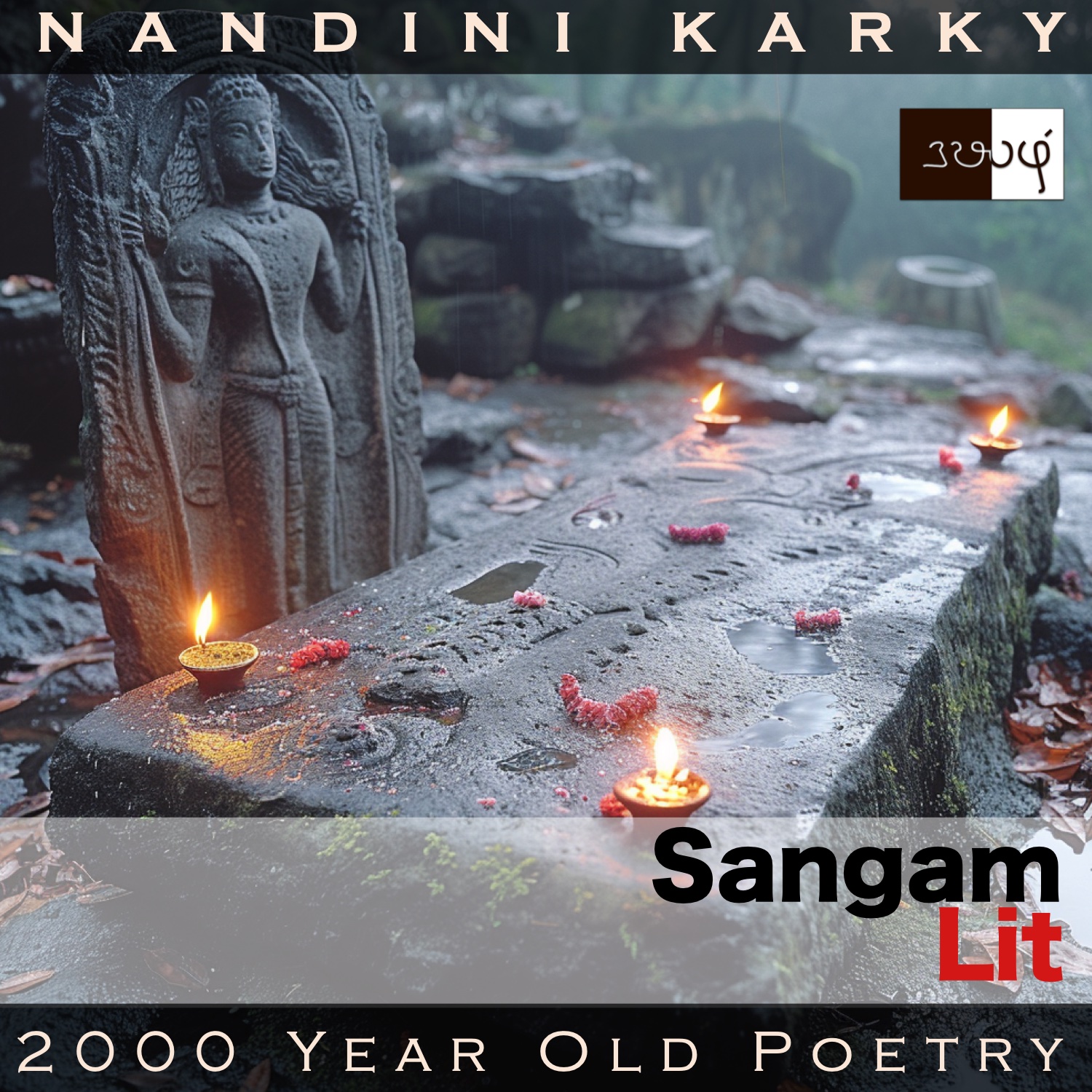Podcast: Play in new window | Download
Subscribe: Apple Podcasts | Spotify | Amazon Music | Android | iHeartRadio | TuneIn | RSS | More
In this episode, we listen to powerful statements about worship, as portrayed in Sangam Literary work, Puranaanooru 335, penned by the poet Mangudi Kizhaar. Set in the category of ‘Vaagai Thinai’ or ‘Victory’, the verse talks about the elements of importance in a leader’s town.

அடல் அருந் துப்பின்………………..
குரவே தளவே குருந்தே முல்லை யென்று
இந் நான்கு அல்லது பூவும் இல்லை;
கருங் கால் வரகே, இருங் கதிர்த் தினையே,
சிறு கொடிக் கொள்ளே, பொறி கிளர் அவரையொடு,
இந் நான்கு அல்லது உணாவும் இல்லை;
துடியன், பாணன், பறையன், கடம்பன், என்று
இந் நான்கு அல்லது குடியும் இல்லை;
ஒன்னாத் தெவ்வர் முன் நின்று விலங்கி,
ஒளிறு ஏந்து மருப்பின் களிறு எறிந்து வீழ்ந்தென,
கல்லே பரவின் அல்லது,
நெல் உகுத்துப் பரவும் கடவுளும் இலவே.
Even though the first line has not been recovered fully, the verse contains valuable insights about perceptions of people and God in the Sangam era. The poet’s words can be translated as follows:
“With a vigour that cannot be vanquished… Tarenna, pink jasmine, wild orange and wild jasmine – Other than these four, there aren’t flowers any; Kodo millet with black stems, foxtail millet with huge stalks, horse gram with small vines and beans with a spotted pod – Other than these four, there aren’t foods any; Thudiyan, Paanan, Paraiyan, Kadamban – Other than these four, there aren’t tribes any; Standing boldly in front and blocking the advance of hostile foes, and felling great battle elephants with shining tusks with spears and becoming a hero stone – Other than this stone, to shower paddy and worship, there isn’t God any!”
Let’s delve into the intricacies. The poet starts with a line about a person’s unconquerable strength, and a few words that follow this statement are missing. However, we understand that’s just the opening, for what follows is a crystal clear, four-layered list of elements. First, the poet talks about four different flowers – Tarenna, Pink Jasmine, Wild Orange and Wild Jasmine and declares there are no other flowers other than these. Then, he moves to the category of food and says other than two types of millet, the horse gram and beans, there are no other food items. This is followed by mention of four different tribes, and in this list, we find two different drummer clans – One tribe who play the ‘thudi’ drum, another tribe who play the ‘parai’ drum, the clan of bards and finally a clan called ‘kadamban’, who could be potters. As in the case of the previous two categories, the poet says there are no other tribes. And finally, he declares other than the person who fought bravely in a battlefield, prevented the attack of enemies, felled battle elephants many and finally turned into a memorial stone, no-one or nothing else is worshipped as God here.
That’s a profound statement to make, indeed! What could the poet mean about the first three elements when he says that ‘Other than these, nothing else is there’? We have seen in other verses that there are hundreds of flowers, numerous tribes in different landscapes as well as their countless food items in the Sangam era. So, we should infer that these are being spoken about this leader’s town in the ‘Mullai’ or ‘Forest’ landscape. This is to lead on to the final statement that this town had no Gods other than their brave ancestors who had been immortalised as hero stones. A clear evidence that what was most valuable in this land was courage in the battlefield, and with that, any human would become not only ‘a God’ but ‘the God’ that the descendants would worship. A magnificent verse to ponder upon the origin of religion!




Share your thoughts...